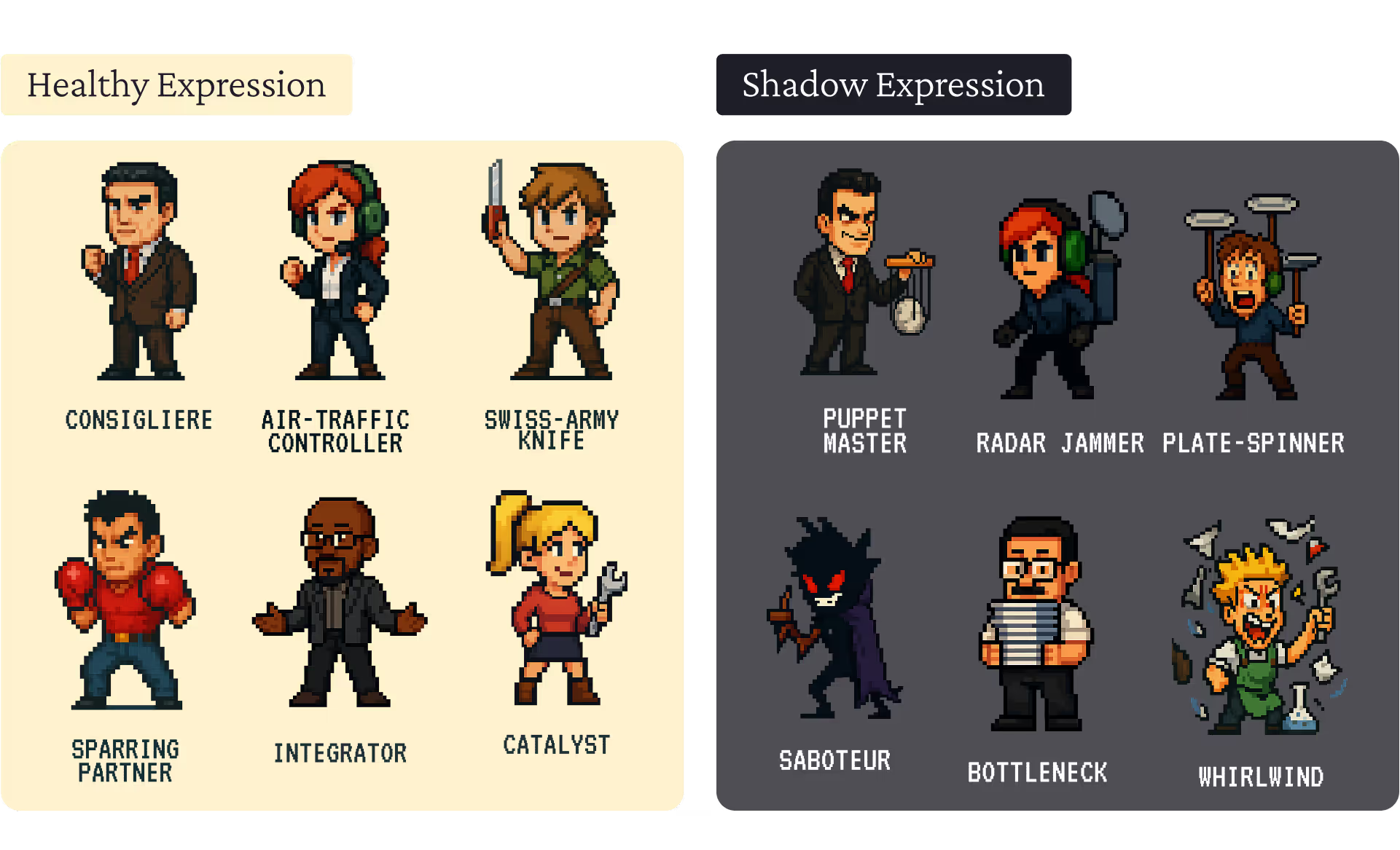Isar runs Uncover, an organisational psychology company that helps start-ups identify and fix people-related issues they’re facing. He also writes a regular newsletter on topics in Organisational Psychology and the future of work. If you are interested in reaching out - you can contact him at Isar@uncover.business.
What goes through your head when you hear someone described as a “Chief of Staff”?
It’s a bit of a tricky one - their role can vary a lot in terms of responsibility, how they are positioned within the company, their relationship with their principal (the senior leader who they report to) and what they actually do on a day-to-day basis. I have a lot of sympathy for them - similarly to them, often my work with start-ups sits in the grey areas in between clear function lines. It’s not surprising then that I frequently find myself working alongside Chiefs of Staff.
Despite the role’s variability - they often play quite a crucial part in a company’s success. They act as a go-between between their principal and other senior leaders, and they often hold together essential processes such as setting OKRs or managing performance processes.
Given these important tasks, these people can turn into single points of failure for their companies. The way that they informally pick up new priorities or manage lots of small (but important) processes means a company’s reliance on them slowly builds over time - typically in a way that’s not visible to their senior leaders. If a Chief of Staff quits or starts to become disengaged, this can amount to a business risk for leaders especially in early and growth stage companies where many of the processes they hold together are still informal or implicit.
At the same time, the responsibilities that come with being a Chief of Staff offer a very dense learning opportunity for individuals. Playing a coordinator role can give a unique perspective over the whole business and, depending on the seniority and experience of the individual, they can be thought leaders with a direct line to the ultimate decision-makers. On several occasions, C-suite leaders or founders have explicitly described their Chiefs of Staff to me as “future leaders”.
So they are often left in this slightly contradictory position - the role varies greatly between companies and over time, many of the tasks they do are unseen and underappreciated, yet despite this ambiguity they are often individuals which leaders have identified as high potential.
Given the diversity of responsibilities and experiences of Chiefs of Staff - I wanted to shift away from what we think of them and instead learn more about how they saw their own roles. So like any good psychologist I carried out a bit of research…
Research approach
I used an approach called Q-methodology. It’s one of my favourite exploratory research techniques that I like to use with my clients. The aim of q-methodology is to capture people’s subjective views about a topic by asking them to rank how much they agree with statements relative to each other. You can look at the relative choices they make to get a good gauge for how they feel - and you can cluster similar responses together to understand if there are any underlying groupings within your sample.
For this study I wanted to focus on three specific categories of question:
- How do they see their role within their company?
- What do they think of their company/principal?
- Do they find their career rewarding?
For each of these three areas we included several statements (both positive and negative) which they would have to rank against each other. A full list of the statements is included at the end of this article for those interested in diving deeper.
I sourced 21 participants primarily from the Chief of Staff network (thank you Rahul and David!) and we used their Chief of Staff levelling framework to align on the “type” of CoS which participants identified as.
Results
So what did we find?
Well here are the overall results across all the full 21 person sample:

[Note: As part of the sorting exercise, participants are forced to fit the statements into an approximate normal distribution - so when sharing the results we’ll align with that same structure to keep things consistent.]
As you can see from the statements - the group was on balance very positive about their experiences as a Chief of Staff. They found their principals to be smart and inspiring, they felt like they were offered a good amount of independence in how they operated, and they found work interesting.
Unsurprisingly, they also agreed that their “companies would struggle to function without them” - highlighting the potential for single points of failure that we mentioned earlier.
These results are interesting, but the real magic of q-methodology comes when we look past the overall results and instead focus on some of the underlying groupings within our sample. So I clustered the data based on how similar individual sorting responses were and found three separate groups:
- 1 large group of 48% of the participants
- 2 smaller groups of 14% and 24% respectively
- A further 3 participants didn’t fit very cleanly into any of these group - which is indicative of the the wide range of different responses we received across the sample
Let’s look at each of these three groups in turn.
Group 1 - The Satisfied Chiefs of Staff

By far the largest group was a group I’ve chosen to describe as the “satisfied group”. They found their work more interesting that the other two groups and they seemed to feel a higher level of certainty about their career direction.
Their view of their principal was very positive - disagreeing with the statement about “not having enough space to operate” and agreeing with the statement about that person being “smart and inspiring”. This positive relationship seems to extend to the wider company, with the statements about “appreciation” and “allies” ranked higher than the other groups.
Group 2 - The Underused Chiefs of Staff

This was the smallest of the three groups - and their responses indicated quite a mixed experience of the Chief of Staff role.
On the positive side, they found their hours sustainable, felt like their pay was fair and would generally recommend the role to friends looking for a similar career path.
However, they also felt more uncertainty about where their career was going and felt like they were under-appreciated by their company’s leadership. It’s hard to make generalisations or draw any causal inferences based on these results, but, they ranked the statement about the “company struggling without them” firmly in the disagree side and were more likely to agree that their principal gave them insufficient space to operate than other groups. This cluster of individuals may feel like their role is less important (or at least is seen as less important) and that they’re being underutilised.
It’s worth noting that despite some challenges, this group did feel like they were still learning and that they could see themselves doing the role for several more years - which indicates the challenges were not overwhelming the positive aspects of the job.
Group 3 - Chiefs of Staff Under Pressure

The third group seemed to find the challenges of the role more acute than our other participants. They were significantly more likely to agree that they felt burned out, that they were underpaid, and that their hours were not sustainable.
Their relationships with their principals also feel more difficult - with fewer of them agreeing that they get enough support and fewer of them finding their principal smart and inspiring.
This is particularly problematic because they largely thought that their companies would struggle without them, which likely adds pressure on them to deliver (despite feelings of burn-out). The context they’re operating within is also more difficult, with more of them saying they are uncertain about their company’s chances of “long term success”.
What do these group results tell us?
As noted above, it’s hard to draw very specific causal links between how the roles are seen and how the individuals are feeling. While it’s clear that many feel positively about the role, it’s not a consistent picture throughout the sample.
When we look at the types of companies our participants came from, it’s clear that growth stage companies are facing the highest rates of challenge:

This could be because it’s the most dense period of change for a company. The majority of my work is with Growth companies because that’s when things seem to be most likely to break. It’s maybe unsurprising then that Chiefs of Staff in these companies feel the most pressure - as they’re normally on the front lines of the breakages trying to repair or at least hold together company processes.
Company context clearly matters. I was surprised to find, though, that it seems to matter substantially more than individual experience or the nature of the Chief of Staff role. I found pretty consistent patterns across differing years of experience and CoS “level”:

Final thoughts
I sought to do this quick study to find out how Chiefs of Staff saw themselves and their careers - we should be a bit careful about interpretation because the sample size is small and there are likely selection biases in the people willing to participate.
Notwithstanding these limitations, the answer seems to be that around half have an overwhelmingly positive experience of the Chief of Staff role, with about a quarter (especially those in Growth companies) feeling much more under pressure.
Take-away for principals: one consistent association across the groups is that the level of support and direction from their principal is strongly linked with the overall experience of a Chief of Staff. The more support & direction, the more positively they are likely to see their role. This is important, because support and direction doesn’t happen by accident - principals need to deliberately create time to engage with and develop their Chiefs of Staff which is crucial when most agree they are single points of failure for many organisations. Moreover, support does not necessitate micromanagement - the most positive people in the sample were the ones who felt like they had space to operate and at the same time felt like they had support & direction from their principal.
Take-away for Chiefs of Staff: all versions of the CoS role rely heavily on personal relationships. A positive relationship with your principal is important, but having a wider group of allies within your organisation is a clear characteristic which distinguishes the first group with the other two.
And if you’re having a tougher time in your role - it’s important to understand that you’re not alone in feeling under pressure. This is especially true if you’re in a Growth company (where almost everyone feels like they’re up against it). If you are in a Growth company and want to talk through some of the challenges you’re facing - feel free to drop me an email (Isar@Uncover.Business); I hold pretty regular quick problem solving sessions to talk through the kind of challenges you might be facing.
Appendix
Full list of q-sort statements:






.avif)
.avif)








